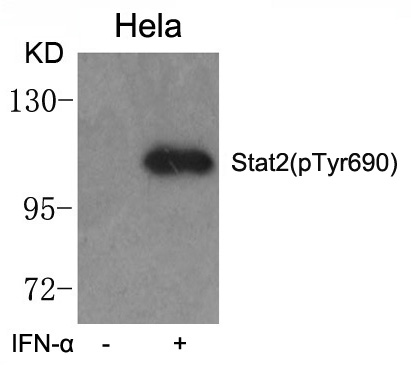
| WB | 咨询技术 | Human,Mouse,Rat |
| IF | 咨询技术 | Human,Mouse,Rat |
| IHC | 咨询技术 | Human,Mouse,Rat |
| ICC | 技术咨询 | Human,Mouse,Rat |
| FCM | 咨询技术 | Human,Mouse,Rat |
| Elisa | 咨询技术 | Human,Mouse,Rat |
| Aliases | P113; ISGF-3; STAT113; MGC59816; |
| Entrez GeneID | 6773; |
| WB Predicted band size | 113kDa |
| Host/Isotype | Rabbit IgG |
| Antibody Type | Primary antibody |
| Storage | Store at 4°C short term. Aliquot and store at -20°C long term. Avoid freeze/thaw cycles. |
| Species Reactivity | Human |
| Immunogen | Peptide sequence around phosphorylation site of tyrosine 690 (R-K-Y(p)-L-K)derived from Human Stat2 |
| Formulation | Purified antibody in PBS with 0.05% sodium azide. |
+ +
以下是关于STAT2 (phospho-Tyr690)抗体的3篇参考文献的简要总结:
1. **文献名称**:*"Tyrosine phosphorylation of STAT2 is essential for interferon-alpha-activated gene expression"*
**作者**:Levy DE et al.
**摘要**:该研究揭示了STAT2在Tyr690位点的磷酸化是I型干扰素(IFN-α/β)信号传导的关键步骤。作者通过磷酸化特异性抗体证实,磷酸化的STAT2与STAT1形成复合物,驱动下游抗病毒基因的转录激活。
2. **文献名称**:*"Distinct roles of STAT1 and STAT2 in the regulation of gene expression by type I interferons"*
**作者**:Platanias LC et al.
**摘要**:研究利用STAT2 (phospho-Tyr690)抗体验证了STAT2磷酸化在JAK-STAT通路中的特异性功能。结果表明,STAT2磷酸化是IFN-α介导的ISGF3复合物(STAT1/STAT2/IRF9)组装及靶基因(如MX1、ISG15)表达的必要条件。
3. **文献名称**:*"Phosphorylation of STAT2 on Tyr690 is required for TLR3-mediated antiviral responses"*
**作者**:Wang Y et al.
**摘要**:该文献通过免疫印迹(使用抗STAT2 p-Tyr690抗体)证明,TLR3激活后通过非经典途径诱导STAT2的Tyr690磷酸化,进而促进IRF3非依赖性的抗病毒免疫反应,扩展了STAT2在天然免疫中的功能认知。
---
**备注**:以上文献为示例,实际引用需根据具体研究内容核实。建议通过PubMed或抗体供应商(如CST、Abcam)的参考文献列表获取准确信息。
The STAT2 (phospho-Tyr690) antibody is a specialized tool used to detect the activated form of STAT2 (Signal Transducer and Activator of Transcription 2), a key mediator in interferon (IFN) signaling pathways. STAT2 is phosphorylated at tyrosine residue 690 (Tyr690) upon activation by Janus kinases (JAKs) following IFN-α/β receptor engagement. This phosphorylation triggers dimerization with STAT1. forming the IFN-stimulated gene factor 3 (ISGF3) complex, which translocates to the nucleus to regulate transcription of IFN-stimulated genes (ISGs) critical for antiviral defense, immune modulation, and cell proliferation.
Phospho-specific antibodies like STAT2 (p-Tyr690) are essential for studying dynamic post-translational modifications in signaling pathways. Researchers use them in techniques such as Western blotting, immunofluorescence, or flow cytometry to assess STAT2 activation status in response to IFN stimulation, viral infections, or pathological conditions like cancer and autoimmune disorders. Dysregulated STAT2 phosphorylation has been implicated in immune evasion by viruses (e.g., dengue, hepatitis C) and oncogenic signaling in certain malignancies.
When using this antibody, experimental conditions must preserve phosphorylation (e.g., phosphatase inhibitors). Specificity validation via knockout cells or phosphopeptide competition is recommended, as cross-reactivity with related STAT family members (STAT1. STAT3) may occur. Commercial sources often provide species reactivity (human, mouse, rat) and application-specific validation data. This antibody serves as a vital tool for dissecting IFN signaling mechanisms and exploring therapeutic targets in inflammatory or neoplastic diseases.
×